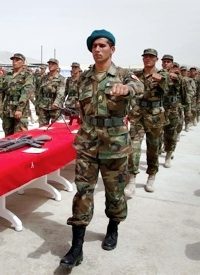
AP and the New York Times reported on July 15 that on the previous day the Afghan government approved a U.S.-backed plan to establish local defense forces that will enable villagers in remote areas of the country to defend themselves against attacks by Taliban insurgents.
Afghan President Hamid Karzai’s office did not release details about the plan, except that the defense force would be under the direct supervision of the Interior Ministry.
AP quoted Pentagon spokesman Geoff Morrell, who said: "This is about putting locals to work, so that they can be on watch in their communities, for people who shouldn’t be there, and then work with the established security organizations — the army, the police, the coalition — to make sure (insurgents) don’t menace their communities.”
“They would not be militias,” said Morrell. "These would be government-formed, government-paid, government-uniformed local police units who would keep any eye out for bad guys — in their neighborhoods, in their communities — and who would, in turn, work with the Afghan police forces and the Afghan Army, to keep them out of their towns.”
The Times reported that the program borrows from the largely successful Awakening groups that General Petraeus created in Iraq, with some major differences, mainly that — unlike in Iraq — the Afghan forces would not accept former insurgents who had switched sides.
Under the plan, elements of several different semiofficial armed forces operating in Afghanistan would all be “gradually disbanded and reintegrated” into a single new force named the Local Police Force, according to a statement released on July 14 by the Afghan National Security Council. (This is in stark contrast to the American concept of “local police” — which strives to keep local police departments completely under the control of municipal governments and certainly not under national governmental control.)
A senior NATO official quoted by the Times said, “Our position has been to develop a solution that bridges between having nothing and having Afghan National Police, and this program does that. So it’s a good development and especially so since it has consensus within the Afghan government and the ownership that come with that.”
A BBC report noted that President Karzai initially resisted the plan precisely because he feared they would be too autonomous and might increase the power of local warlords. However, when the deal with NATO provided that the force will report to the Afghan Interior Ministry, Karzai agreed. (A report in the Los Angeles Times said that the Afghan government agreed “under pressure from Army Gen. David H. Petraeus.”)
A report in the Washington Post for July 15 about the new security force in Afghanistan observed:
Criticism of the strategy that Obama announced in December has grown rapidly in recent weeks as casualties have continued to rise and Afghanistan has surpassed Vietnam as the longest war in U.S. history. Much of the news has been mixed at best, including an increase in reports of Afghan government corruption and slow progress in military offensives on the ground.
Public impatience and concern over the cost in lives and money have been reflected in congressional demands for results. Many Republican lawmakers have condemned the July 2011 deadline Obama set for beginning a drawdown of U.S. forces as giving aid and comfort to the enemy, and some Democrats have said the troops should come home now.
Some lawmakers have asked why the massive civilian program is necessary if the goal is to destroy Pakistan-based al-Qaeda. Even those who are largely supportive of the effort, such as Kerry, have raised increasingly public concerns.
Many commentators on the war in Afghanistan have noted the historic resilience of Afghan fighters against outside forces, citing the failed British and Soviet expeditions in the mountainous country, making an excellent point that outside intervention there is doomed to failure. However, a question that might be asked is: "If the Afghans are such fierce warriors, why are they so ineffective against the relatively few al-Qaeda and Taliban insurgents that have gained control of so much of their territory?" Part two of the question might be: "If Afghanistan as a nation lacks the resolve to fight these insurgents, why should the United States and its allies send it best young warriors to die on its behalf?"
The latter question was often asked of the government of the former nation of South Vietnam, and everyone knows the results of that struggle.
Photo: Recruited Afghan soldiers at the Ghazi Military Training Center, being trained by Turkish military officers of the NATO-led International Security Assistance Force (ISAF): AP Images



